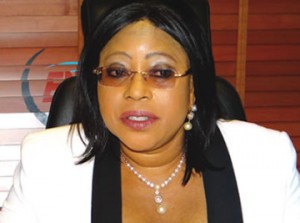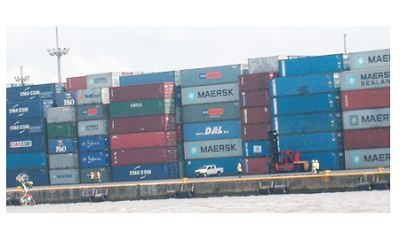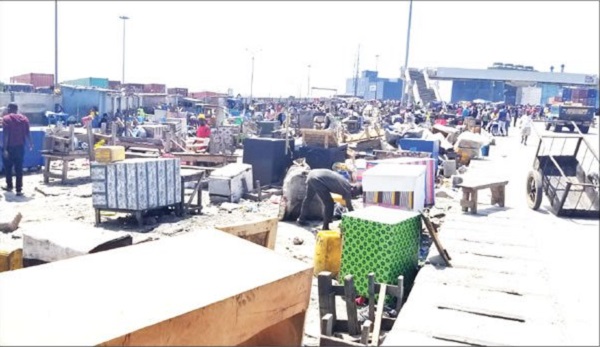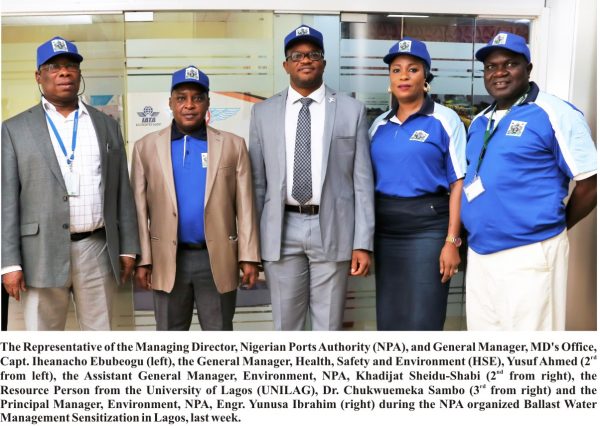New Weight Cost: Terminal Operators Lay Ambush For Shippers
-

Dr Vicky Haastrup, President of STOAN IMO’s container weight rules take off July 1
- Nigeria, Ghana, others seek exemption
The take off of the International Maritime Organisation (IMO’s) new rules on container weight verification come July 1, 2016 may worsen Nigeria’s uncompetitiveness in the global market as terminal operators lay ambush for shippers.
Speaking in Abuja, last week, at a two-day Sub-regional workshop on Transport Costs and Connectivities of West and Central African countries, the Secretary General of Global Shippers’ Forum (GSF), Mr. Chris Welsh, explained that under the new IMO’s rules no container is allowed to be loaded onto vessels anymore unless the weight is verified and certified.
The responsibility to verify the actual gross mass of the container, including the goods, packing and stowing materials, packets and the tare weight of the container, Welsh added, rests with the shippers.
While he explained that the rules apply to export containers wherein the shipper takes the burden of verifying the gross mass weight of the container, observers have reasoned that it is not always possible because the most practical place to weigh containers is in the terminals as they arrive by road or by rail.
The adoption of these rules followed the IMO’s Maritime Safety Committee (MSC) approval in May 2014 for changes to take place in the Safety of Life at Sea (SOLAS) convention, making it mandatory for shippers to have container weight verification requirements.
Subsequently, the Dangerous Goods, Solid Cargo and Container (DSC) sub-committee of the MSC equally gave nod for changes in SOLAS convention, following which the MSC adopted it on November 21, 2014, making it mandatory that every container must be verified before placed onboard ships.
Earlier in June, 2012, the government of Denmark, the Netherlands and the United States, along with a group of five maritime industry associations led by the World Shipping Council (WSC), co-sponsored a formal proposal to the IMO to amend the SOLAS convention which would require the weight of all packed containers be verified prior to loading onboard vessel for export.
However, MMS Plus gathered that only three African countries are ready for the implementation of the new rules. They are: South Africa, Morocco and Kenya.
Nigeria, Ghana, Angola, among others, are not ready, necessitating the call by the President of Shippers’ Association of Lagos(SAL), Rev. Jonathan Nicol for Nigeria and other African countries to be exempted from the rules in his intervention on the floor.
Similarly, the Managing Director of Ghana Shippers Council (GSC), Dr. Kofi Mbiah, who is also the Chairman of the Union of African Shippers’ Council (UASC) equally called on the IMO to give African countries concession on the new rules implementation.
Speaking on the container weight calibration and certification, Dr (Mrs.) Omolara Akanji of the International Chamber of Commerce(ICC) Nigeria, observed that it would increase the prices of Nigerian exports, adding however, “ if we are left behind, it will affect our exports”
Speaking on the Strategies for Implementing the new IMO rules on Container Weighing, Welsh, who explained that the new SOLAS rules are an amendment to existing regulations raised the issue of who bears the risks in event of liability, arguing that, “the shipper is ultimately responsible for the provision of an accurate verified gross for each packed container to the carrier or its terminal representative regardless of who packs the container”.
In her defence of the shippers, the Director, Commercial Shipping Services Department, Nigerian Shippers’ Council (NSC), the host of the event, Mrs. Dabney Shall-holma, stated that the terminal operators, shipping companies, and shippers have to share the responsibility of verifying the container weight in turns, emphasizing that the shipper must not be charged for that.
The IMO regulations on the weight verification states that : “The responsibility for obtaining and documenting the verified gross mass of a packed container lies with the shippers. A container packed with packages and cargo items should not be loaded onto a ship to which the SOLAS regulations apply unless the master or his representative and the terminal representative has obtained, in advance of vessel loading, the verified actual gross mass of the container”.
No specific requirements are given by IMO as the law of each country applies. Empty containers will not have to be weight verified, even as transshipped containers will not have to be weight verified.







